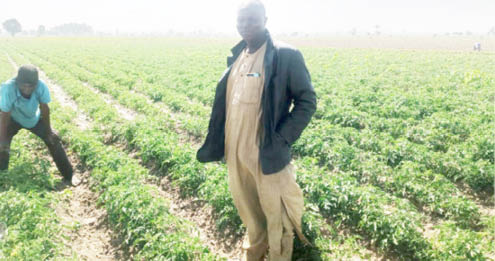Election: Farmers wary, abandon tomato for wheat, rice in Kano
As the dry season farming commenced, Tomato farmers in Kano are concerned as the 2023 elections approach coupled with high cost of farm inputs, particularly fertiliser. The incident has forced many of them to abandon tomato farming this season and resort to other crops, despite the expectations of bumper yield from tomatoes. Daily Trust gathered […]

As the dry season farming commenced, Tomato farmers in Kano are concerned as the 2023 elections approach coupled with high cost of farm inputs, particularly fertiliser. The incident has forced many of them to abandon tomato farming this season and resort to other crops, despite the expectations of bumper yield from tomatoes.
Daily Trust gathered that one of the reasons why the farmers are apprehensive about the approach of the general elections is because the supply of tomatoes to the southern part of the country is likely to face obstacles.
During a visit to one of the largest irrigation areas in Kano, Kadawa, in Kura LGA, the farms were found deserted, while those still planted, had other crops, with very few having tomatoes. Some of them had wheat and others had onions, and were using irrigation to water the crops.
The farmers who spoke said over the years, they had been coping with the risks associated with tomato farming, but this time around, they decided to step down due to concrete reasons. They said very few of them planted tomatoes this season, and they had no guarantee that they would earn a profit as fertiliser and other inputs are costly.
Major events that shaped environment sector in 2022
7 burnt to death on Sagamu-Benin expressway
Speaking to Daily Trust, Salisu Mai Dabino Dorawar Sallau, one of the major tomato farmers in the region, said although he farms up to six hectares of tomatoes a season, he couldn’t do even one hectare this time around as they have no guarantee if the product could be transported to the market during the coming elections, as they have been victims of different election crises.
“We have to divert to other crops this season. Our region, Gafan and Kadawa, is one of the largest tomato farming areas, if not the best in the whole of Africa. But look at the place now, it is deserted. In a block of 15 hectares, you will hardly see one hectare of tomato, the remaining are all wheat. But in the previous seasons, if you had come to this place by now, you would see tomatoes all over.
“The reasons are the fact that the election is approaching and the tomato is transported to the south. We have been victims of several election crises, and that was the end for some of us.
“Also, the risks in tomato farming are enormous. This time around, because fertiliser and other inputs are costly, it is difficult to go into tomato farming without feeling concerned. That is why many farmers decided to farm crops that can be dried, like wheat, so that if the market is not appreciating them, they can keep their harvest in the store.”
He added that other factors were the high cost of transportation, which is a result of the hike in diesel prices, which in turn affects profit negatively.
“Before, we used to pay N500,000 per trailer, but now it is between N1.2 and N1.3 million. How can we recoup our capital, pay labourers and settle dealers, and also make profit? It is very risky.”
According to Mai Dabino, the only way out for them to continue tomato farming is for the government to provide storage facilities and companies that will patronise them in the North without transporting the tomatoes to other regions.
He said the few companies in Kano are not enough and only patronise large-scale farmers that can produce over one trailer per single harvest. “We, the small farmers, are not getting farm inputs from the government, and the companies normally reject our tomatoes. That is why we continue taking our tomatoes to the South.
“Tomato is one of the most lucrative farming if you are lucky, and also used improved seed. One hectare can give you up to 1000 baskets. But you have to spend as much as N700,000. You need 15 sacks of fertiliser, among other things,” he concluded.
